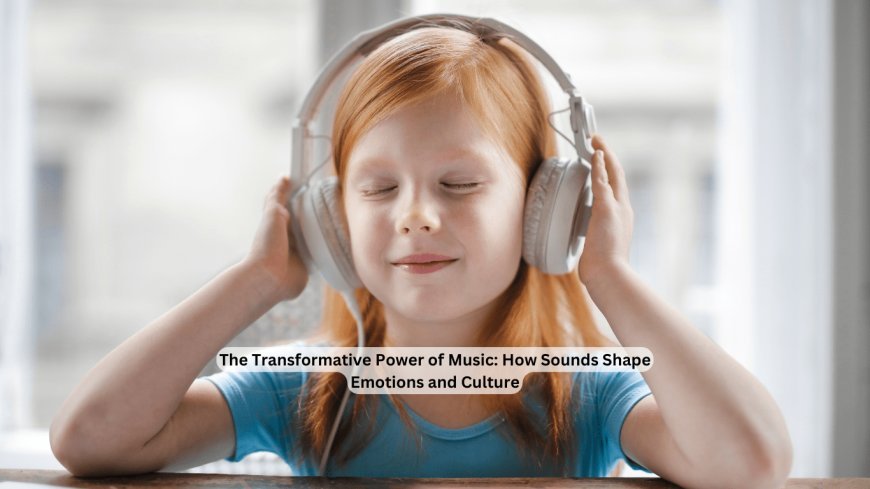The Transformative Power of Music: How It Shapes Emotions and Culture
Discover how music influences emotions, connects people, and impacts cultures worldwide. Dive into the powerful role of sound and rhythm in shaping human experiences and society.

Introduction:
Music affects emotions, relationships, and communities globally beyond enjoyment. Simple or complicated melodies may connect, heal, and inspire. Explore how sound affects hearing and spirit.
Blog Summary:
This blog examines the close link between music, emotions, and culture. We'll investigate how music impacts emotions, unites individuals, and alters societies and movements. This article examines how music affects life, from brain research to global culture. Want me to continue?
The Transformative Power of Music: How Sounds Shape Emotions and Culture
Musical expression transcends language, culture, and boundaries. Not only does it fill silences, it stirs emotions, develops bonds, and impacts civilizations worldwide. A drum beat, melody lyrization, or orchestra crescendo all change.
This blog will discuss how music impacts emotions, cultural identity, and why it has always been a source of connection and expression.
The Emotional Power of Music: More Than Just Sound
Have you noticed how a song can suddenly make you laugh or cry? Because music directly affects our emotions. Music evokes intense emotions—why? The solutions are scientific.
How Music Impacts the Brain
Music has remarkable brain effects. Because it produces dopamine, the “feel-good” neurotransmitter, your favorite music might make you feel wonderful. Music also engages memory, movement, and emotion centers in the brain, according to research.
An example is:
-
Happy Tunes = Energy Boost: Upbeat music boost mood and performance. Imagine how sportsmen utilize pump-up tracks before games!
-
Sad songs release emotions: Despite making us weep, melancholy music helps us release pent-up emotions and feel better.
-
Nostalgic Tracks = Memory Activation: Ever heard an old song that instantly transported you to a specific moment in time? That’s the hippocampus and prefrontal cortex working together.
Music as a Universal Language
Unlike spoken languages, music speaks to the heart globally. Indian lullabies may relax like Peruvian ones. This universality makes music special—it bonds us.
Music as a Cultural Thread: A Reflection of Identity
National anthems and folk songs convey people's stories, ideals, and histories.
Cultural Traditions and Rituals
Many cultures associate music with tradition. African drumming explores rhythm, narrative, communication, and spirituality. Chants and melodies tell indigenous history.
Examples of music's cultural impact:
-
Religious Ceremonies: Hymns, chants, and prayers create a sacred atmosphere and connect worshippers to their spirituality.
-
Festivals and Celebrations: Think of Carnival in Brazil, where Samba sets the stage for vibrant cultural expression.
-
Protests and Movements: Music has also been a tool for social change. Songs like “We Shall Overcome” became anthems during the Civil Rights Movement, galvanizing people for justice and equality.
Cultural Fusion Through Music
Nowadays' globalized music is a melting pot. Reggaeton, K-pop, and Afrobeat show how music can blend cultures. Fusion fosters diversity, understanding, and peace.
The Healing Power of Music
Music therapy is a respected mental and physical health treatment. Music heals in hospitals and treatment.
Music and Mental Health
Music may boost focus, reduce anxiety, and alleviate depression. Relaxation and meditation use mindfulness playlists with soothing sounds.
Physical Healing Through Rhythm
Music also benefits the body. Studies suggest that relaxing music reduces pain and stress in surgical patients. More amazing? In rhythmic music treatment, Parkinson's sufferers' motor abilities improve. Music is used in many rehabilitation programs because rhythm and movement are intimately linked.
Music Brings People Together: A Tool for Connection
Music links people miraculously. Whether it's a family singing Christmas songs or strangers singing at a concert, music unites us.
Shared Experiences
Consider how music events unify hundreds of varied people. Coachella and Glastonbury are about community, energy, and fun, not just music.
Bridging Divides
Music transcends generations, politics, and cultures. Slow-connecting people may find comfort in a simple song. International artist connections show how music unites.
The Role of Music in Modern Media and Technology
Music is omnipresent nowadays, from TikTok to movie soundtracks. Technological advances have increased its effect..
Music in Film and TV
Think about your favorite film scene. It was likely notable for the music. Without “My Heart Will Go On,” “Titanic” is different! Music gives stories emotion, atmosphere, and depth.
Social Media and Music Trends
TikTok and Instagram have democratized music. A single song may launch a new artist or rejuvenate an old one. Music is more accessible and shared than ever now.
Final Thoughts: Music as a Lifelong Companion
Music influences people and societies, not simply noise. Tells tales, cures, and entertains. Music has survived from ancient times until now.
Next time you hum your favorite song, think of how music affects your mood, links you to others, and improves civilizations.

 Najmul Hasan
Najmul Hasan 





